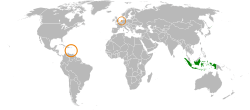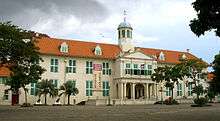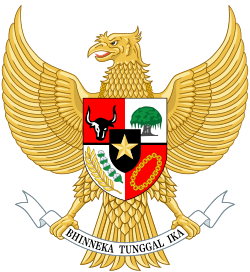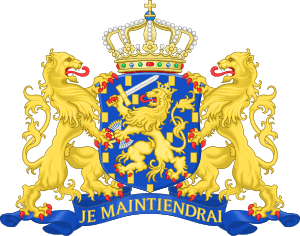Indonesia–Netherlands relations
 | |
Indonesia |
Netherlands |
|---|---|
Indonesia–Netherlands relations refers to relations between Indonesia and the Netherlands. Indonesia and the Netherlands share a special relationship,[1] embedded in their shared history of colonial interactions for centuries. The relationship began during the spice trade as the Netherlands established VOC trading post in what is now Indonesia, before colonising it as the Dutch East Indies until the mid 20th century. Indonesia was the largest former Dutch colony. In the early 21st century, the Dutch government has committed to boosting its relationship with Indonesia, noting that economic, political, and interpersonal contacts should be further strengthened.[2]
History

In 1603, the Dutch East India Company commenced operations in Indonesia where it fought battles to expand its domain.[3] Though Indonesian history featured other European colonial regimes, it was the Dutch who solidified their hold on the country. After the Company's bankruptcy in 1800, the Dutch state took control of the archipelago in 1826.[4] Following this the Dutch state also fought against the natives and then enforced a period of forced labour and indentured servitude until 1870 when, in 1901, they adopted the "Dutch Ethical Policy and Indonesian National Revival," which included a somewhat increased investment in indigenous education and modest political reforms. Only in the 20th century, however, was Dutch rule enhanced to what would become Indonesia. Following Japanese occupation during World War II, the Netherlands tried to re-establish their rule,[5] amid a bitter armed and diplomatic struggle that ended in December 1949. International pressure then forced the Dutch to formally recognise Indonesian independence.[6] In 1956, the socialist government of Indonesia cut off all diplomatic ties with the Netherlands, ties that were restored only in 1968 by the new right-wing government.
High level visit

In 1970, Indonesian President Suharto paid an official visit to the Netherlands, which was reciprocated by Queen Juliana and Prince Bernhard of the Netherlands royal visit to Indonesia in 1971.[7] Queen Beatrix and Prince Claus also paid a royal visit to Indonesia in 1995.[8]
Political ties
Relations between the two have been marred by the separatist intentions of the West Papua Movement.[9] Additionally, the Republik Maluku Selatan also seeks separation from Indonesia. In this vein, they have attacked targets[10] in the Netherlands in the 1970s and 1980s, seeking to force the country to pressure Indonesia into allowing for the secession of their nation. Political ties were then strained as Indonesian officials refused to visit the Netherlands while the group was allowed to bring cases to court against them.[11] In 2010, the Indonesia president, Susilo Bambang Yudhoyono, cancelled a visit to the Netherlands after the group's activists asked a Dutch court to issue an arrest warrant for him.[12] The move was condemned by pro-Indonesia Moluccan activists in Jakarta.[13]
However, the visit of the Dutch Minister of Foreign Affairs Bernard Bot to Indonesia in 2005 to celebrate its 60th independence day anniversary was claimed by the Netherlands to have "marked a[n] historic moment in the relations between the two countries. After this visit, the relation between Indonesia and the Netherlands was further intensified and strengthened by the extension of the cooperation in a wide range of fields."[14]
The Netherlands recalled its ambassador to Indonesia following the 18 January 2015 execution of Ang Kiem Soei, a convicted drug trafficker who was sentenced to death in Indonesia.
Economy and trade
.jpg)
The Netherlands is one of Indonesia’s most important trade partners in Europe. Trade between the two countries in between January and September 2012 reached US$3.314 billion, while efforts are currently underway to further boost that figure.[2]
The Port of Rotterdam and Schiphol Airport have been the main entry points for Indonesian products into the European Union. Similarly, Dutch companies have seen Indonesia as their gateway to the larger ASEAN market, which is home to more than 500 million people.
Development assistance
For over 25 years, from 1966 to 1992, development assistance was provided by the Netherlands to Indonesia within the arrangements of the Inter-Governmental Group on Indonesia (IGGI).[15] IGGI had been established in the late 1960s to help coordinate the flow of foreign aid to Indonesia and was convened and chaired by the Dutch government for over two decades throughout the 1970s and 1980s. However, in the early 1990s, the then-Minister for Development Cooperation in the Netherlands, Jan Pronk, became increasingly critical of domestic policy in Indonesia. In response, in early 1992, the Indonesian Government indicated that it no longer wished to participate in the annual IGGI meetings in The Hague and preferred that a new donor consultative group, the Consultative Group on Indonesia (CGI), be established and be chaired by the World Bank.[16] Initially, the Netherlands was not invited to attend CGI meetings. Later, the Netherlands became a member of the group.
Military ties
The Indonesian military still sometimes buys equipment from the Dutch.[17]
Cultural relations

Traces of Dutch influences in Indonesia include Dutch origin loanwords in Indonesian and cuisine. Some Indonesian dishes have been adopted and, in turn, influenced Dutch cuisine.
Though cultural relations are no longer strong, Christianity in Indonesia was a result of proselytisation by mainly Dutch missionaries.[18] There is also a large Indonesian population in the Netherlands. Many have set up their own churches in what has been termed as a "reverse mission," referring to the Dutch missionaries in the colonies.[19]
Another legacy of colonial rule in Indonesia is the legal system that was inherited from the Dutch. In 2009, the Dutch Minister of Justice Ernst Hirsch Ballin visited Indonesia in what some considered a stepping stone to reforming its legal system.[20]
Through centuries of colonial relations, numbers of cultural institutions in the Netherlands — such as Tropenmuseum and Rijksmuseum voor Volkenkunde in Leiden — has large collections of Indonesian archaeology and ethnology artifacts. Both are the leading center of Indonesian studies in Europe, specialized in its culture, history, archaeology and ethnography. The Erasmus Huis — the Netherlands' cultural centre — was established in 1970 in Jakarta. It was meant as cultural cooperation to promote art and cultural exchanges between Indonesia and the Netherlands. Besides many exhibitions, music performances and films screenings, some lectures on Dutch and Indonesian culture are being held on a regular basis in their auditorium and gallery.[21]
Current issues
Drug smuggling and capital punishment
In January 2015, the Netherlands recalled their ambassador after Indonesia ignored their pleas for clemency and executed six prisoners for drug offences, one among them is Dutch citizen Ang Kiem Soei. Dutch Foreign Minister Bert Koenders condemned the death sentence, saying that it is a cruel and inhuman punishment.[22]
Famous Dutch-Indonesians
See also
References
- ↑ Retno Marsudi (April 2, 2012). "Indonesia and the Netherlands: A special relationship". thejakartapost.com. The Jakarta Post. Retrieved 29 May 2013.
- 1 2 "Netherlands to put new emphasis on ties with Indonesia". thejakartapost.com. The Jakarta Post. February 21, 2013. Retrieved 29 May 2013.
- ↑ Ricklefs, p.29
- ↑ Ricklefs (1991), page 24
- ↑ "Indonesian War of Independence" Dutch wanted to reoccupy Indonesia
- ↑ Charles Bidien (5 December 1945). "Independence the Issue". Far Eastern Survey. 14 (24): 345–348. doi:10.1525/as.1945.14.24.01p17062. ISSN 0362-8949. JSTOR 3023219. ; "Indonesian War of Independence". Military. GlobalSecurity.org. Retrieved 2006-12-11.
- ↑ "State visit of Queen Juliana and Prince Bernhard to the Republic Indonesia in 1971". Dutch Docu Channel, via Youtube. Retrieved May 20, 2014.
- ↑ "Queen Beatrix and the former Dutch colonies". KITLV. Retrieved May 20, 2014.
- ↑ Papuan self-determination - historical roots VII | Webdiary - Founded and Inspired by Margo Kingston
- ↑ Moluccans in the Netherlands: a snapshot about Refugees in Holland
- ↑ RMS issue frustrates Dutch-Indonesian relations | Radio Netherlands Worldwide
- ↑ Indonesia leader delays Dutch visit - Asia-Pacific - Al Jazeera English
- ↑ INDONESIA: Group of pro-government activists protest against rivals seeking the arrest of President Susilo Bambang Yudhoyono
- ↑ Political Affairs - Netherlands Embassy in Jakarta
- ↑ Dutch development policy in Indonesia, including the work of the IGGI, is discussed in detail in J.A. Nekkers and P.A.M. Malcontent (eds), 2000, Fifty Years of Dutch Development Cooperation 1949-1999, The Hague: Sdu publishers.
- ↑ According to Malcontent and Nekkers, the episode caused "an uproar" in The Hague. For details, see P.A.M. Malcontent and J.A, Nekkers, "Introduction: Do something and don't look back", in J.A. Nekkers and P.A.M. Malcontent, ibid., p. 51.
- ↑ THE DUTCH - INDONESIA CORPORATE CONNECTION - Moluccas International Campaign for Human Rights
- ↑ http://www.bezinningscentrum.nl/Religion_Development/ufford.pdf
- ↑ http://www.calvin.edu/henry/ISSRC/Conferences/Papers/jansen06.pdf
- ↑ VIVAnews - Indonesia-Netherlands Relations: We Cannot Extradite Fugitive
- ↑ "The Erasmus Huis, Dutch Cultural Centre in Jakarta Indonesia". The Erasmus Huis. Retrieved May 20, 2014.
- ↑ Chris Nusatya in Jakarta, Toby Sterling in Amsterdam, and Silvio Cascione in Brasilia; Writing by Randy Fabi; Editing by Paul Tait (17 January 2015). "Brazil, Netherlands recall Indonesia ambassadors after executions". Reuters. Retrieved 19 February 2015.

